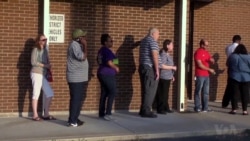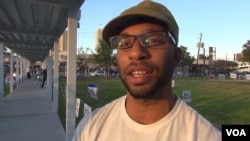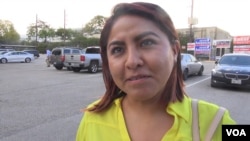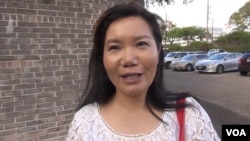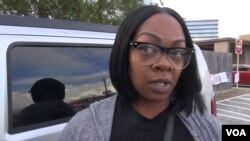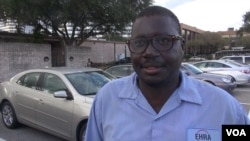Recent polls in the southwestern U.S. state of Texas show an unexpectedly tight race between presidential candidates Democrat Hillary Clinton and Republican Donald Trump.
In the past few presidential elections in the state, the Republican candidate won by a margin of 10 points or more. Republican candidate Mitt Romney won by more than 15 percent in 2012.
With its 38 electoral votes — second only to California — Texas is the foundation upon which any Republican victory in a presidential race must be built.
While most political analysts and pollsters believe Trump will win the Lone Star State, no one can be sure.
Since early voting began October 24, lines have been long. Turnout is expected to break records.
In Harris County, which is mostly covered by the city of Houston, more Democrats have been voting than Republicans. That likely is true in other large Texas cities, such as Dallas and San Antonio.
As past elections have shown, however, Democrats can win by close margins in the urban areas and still lose the election when the votes from suburbs and rural communities are counted. Those areas tend to lean strongly Republican.
Diversity factor
In Harris County, the diversity of the population is reflected in the voters. Blacks, whites and Hispanics are joined by Latin Americans, Vietnamese, Chinese, Indians, Pakistanis and many others who have immigrated here and become citizens.
Democrats, who typically are favored by such groups, hope the large turnout in Texas cities will help their party’s candidate, Hillary Clinton.
Looking more closely at voter decisions, though, can reveal a messy scene. Some voters support one candidate mainly as a way of opposing the other. It is unclear how much support such voters will give to candidates for other positions further down the ballot.
Voters also can express surprising opinions.
"I think that it is real nice that Hillary Clinton will be the first woman that will be the president," said Brandon Sales, a young African-American man who voted for Clinton.
But, in a year in which animosity between rivals is especially strong, he said he likes both candidates. Of Trump, Sales said, "I like him. He is funny; he has a good sense of humor."
Vanessa Fernandez, who came here with her immigrant parents from Bolivia when she was 5 years old, said Trump's harsh words on immigrants angered her.
He doesn't like immigrants and that bothers me, because I am an immigrant,” she said. “So, I am voting for Hillary Clinton."
Varied opinions
But what could confound expectations is the independent thinking of many minority voters.
Politicians talk a lot about illegal immigration, for example, but for many Hispanics, issues like job creation and education are the key.
Saul, a U.S. naturalized citizen from Guatemala, told VOA he is most concerned about his children and their future. He said the economy, job creation, national security and education are all topics of importance to him.
"Immigration is an important item, yes, but not the top one at this moment," he said. He declined to say for whom he would vote.
Immigrants, like everyone else, have diverse opinions.
Chuk Li, who was born and raised in China, voted for Trump.
"I think he would be a great leader, compared to Hillary. With Hillary, there is too much unclear," she said.
Global high stakes
Distrust of Clinton has driven some Democrats to vote for Green party candidate Jill Stein.
Rodrea, a middle-aged black woman, said she decided to vote for Stein even though that might help Trump win the close race in Texas.
"I'll take my chances on that," she said. "I just know that I will not be voting for either [major party candidate]."
There also are Republicans voting for Libertarian presidential candidate Gary Johnson, or writing in someone else.
This year's U.S. presidential election has alarmed people around the world, many of whom worry the United States may change its foreign policy. Both Clinton and Trump have attacked free-trade agreements, for example.
Trump's plan to ban Muslims from entering the country is one of the reasons that Muslim Moustapha Niang, an immigrant from the West African nation of Senegal, decided to vote for Clinton. He said his relatives and friends are worried about the outcome.
"From home — from Italy, Spain, everywhere — they are hitting me on Facebook, asking me about this election," Niang said.
Lone Star Republicans
One reason Trump is not further ahead in Texas is that he has upset many so-called establishment Republicans, who favor free trade.
A University of Texas poll released last week showed Clinton only 3 percentage points behind Trump in Texas, which is within the margin of error. That poll also showed that while 66 percent of Clinton voters favor her for her personal qualities and experience, only 53 percent of Trump voters backed him for that reason.
Among independents, the pollsters found that 46 percent favor Trump, 19 percent back Clinton, and the rest are opting for minor party candidates or do not plan to vote.




